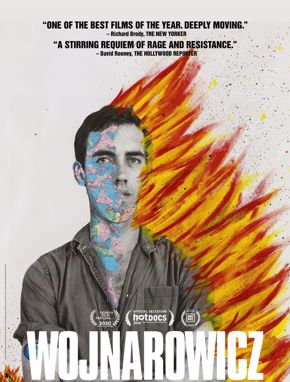Virtual Cinema | New Documentary Paints a Riveting Portrait of Artist & Activist David Wojnarowicz March 23, 2021
“One of the last frontiers left for radical gesture is in the imagination.” —David Wojnarowicz
In art history, the late 1970s and early 1980s in the East Village of downtown Manhattan is a fabled era, producing iconic artists such as Jean-Michel Basquiat and Keith Haring.
A superb new documentary paints a riveting portrait of another major figure from that time: David Wojnarowicz, the gay American artist who died at 37 of AIDS in 1992 after blazing a trail of confrontation and indefatigable activism with ACT UP. He also created a body of work with arresting beauty and surreal power.
Brilliance and Chaos
For the film Wojnarowicz, director Chris McKim draws on the artist’s archives, video journals, cassettes, photos, Super8 videos, and even answering-machine messages. McKim creates a vivid evocation of the brilliance and chaos of Wojnarowicz’s life and the cultural ferment of the East Village art scene in the 1980s.
Wojnarowicz had exceptional range in a comparatively brief career of just 15 years: He was a published writer, a visual artist, a photographer, and a musician in a punk-rock band called 3 Teens Kill 4.
Culture Wars
Wojnarowicz took the pain of living as an openly gay man with AIDS in an extremely homophobic era and fearlessly transmuted the pain into art that was dark, powerful, and sometimes breathtakingly beautiful. He landed in the middle of the culture wars of the late 1980s and early 1990s when the National Endowment for the Arts withdrew funding for an exhibition in which he was featured, calling his work too political.
“Is the fact that I may be dying of AIDS in 1989, is that not political?” he demanded in an interview. “Is the fact that I don’t have access to health insurance, and the fact that I don’t have access to adequate health care, is that not political?” As curator and critic Ruth Erickson observed, “Wojnarowicz collided the personal and the social to attack the dominant paradigm of a nation in the throes of a cultural war.”
Silent No More
“Whatever work I’ve done, it’s always been informed by what I experienced as an American in this country, as a homosexual in this country, as a person who is legislated into silence in this country,” Wojnarowicz said. Almost three decades after his death, Wojnarowicz is silent no more. His furious, prophetic voice resonates in McKim’s gritty, mesmerizing documentary, asking difficult questions that remain profoundly relevant.
• Wojnarowicz / WATCH HERE Your ticket ($12) supports the MFAH and provides a 5-day pass to the film.
About the Author
Andrew Edmonson is the Museum’s membership manager.
Underwriting for the Film Department is provided by Tenaris and the Vaughn Foundation. Generous funding is provided by Nina and Michael Zilkha; The Consulate General of the Republic of Korea; Franci Neely; Carrin Patman and Jim Derrick; Lois Chiles Foundation; ILEX Foundation; L’Alliance Française de Houston; and The Foundation for Independent Media Arts.






